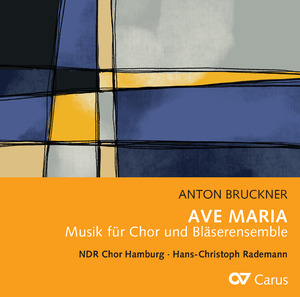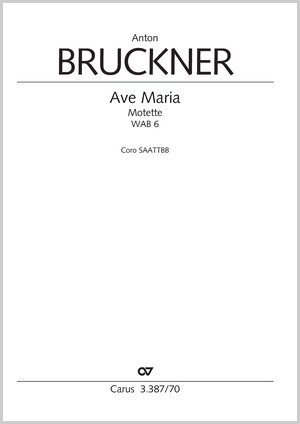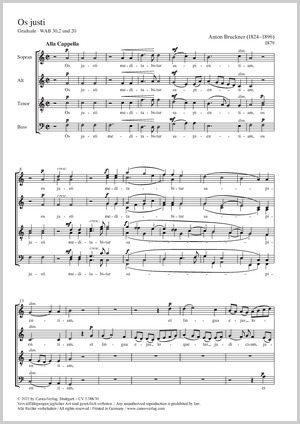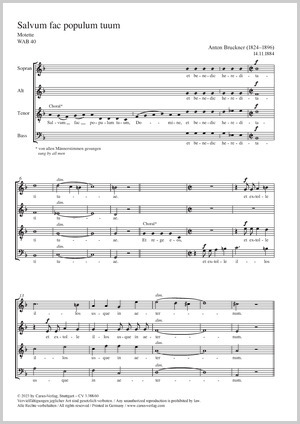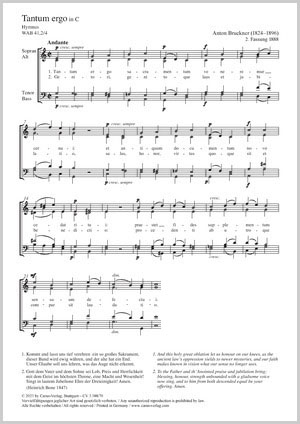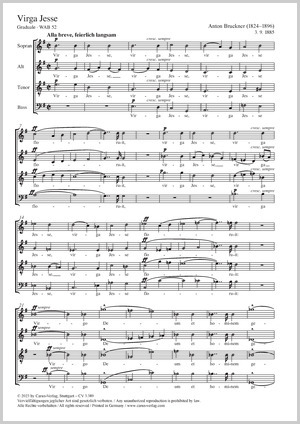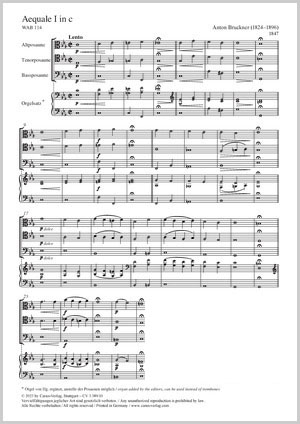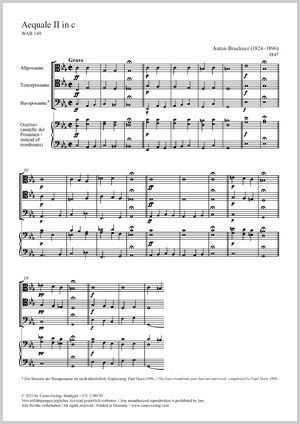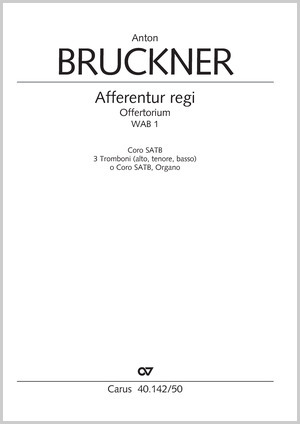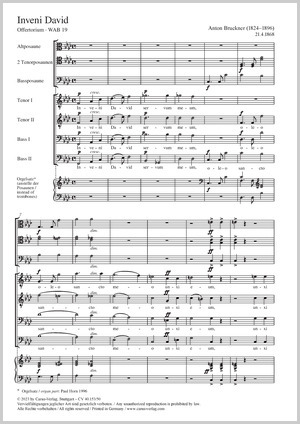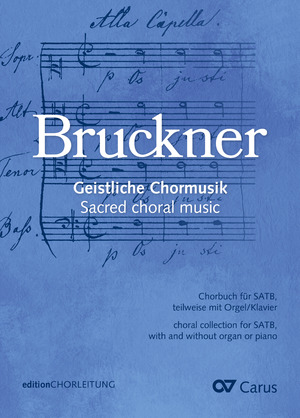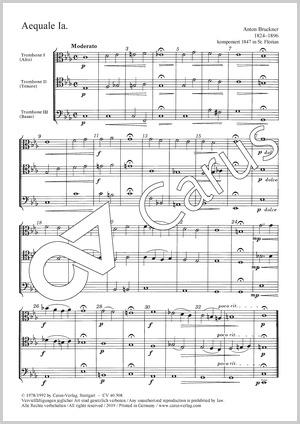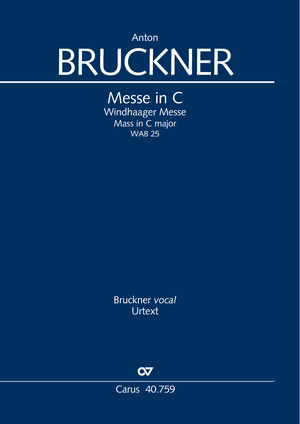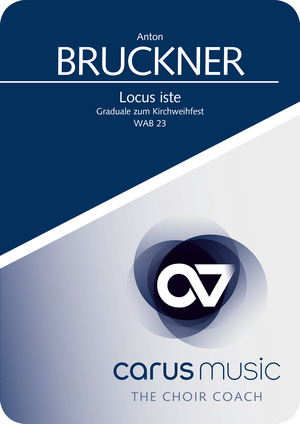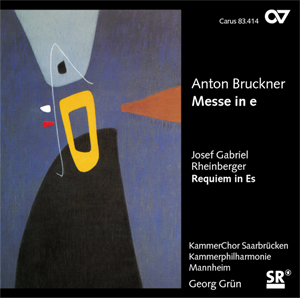Ave Maria
Musique pour chœur et ensemble à vent
Le NDR Chor Hamburg sous la direction de Hans-Christoph Rademann présente une large sélection d’œuvres sacrées d’Anton Bruckner pour chœur et ensemble de cuivres. Les pièces couvrent quasiment une période de 50 ans, ce qui permet aussi de comprendre l’évolution de ce compositeur profondément religieux.
Acheter
Informations complémentaires sur l'œuvre
Sommaire
-
Compositeur
Anton Bruckner
| 1824-1896Anton Bruckner wurde 1824 in Ansfelden (Österreich) geboren und hatte kein sonderlich einfaches Leben. Der österreichische Komponist stammte aus einfachen, ländlichen Verhältnissen und wurde ein Leben lang von Selbstzweifeln geplagt. Nach dem Tod seines Vaters wurde er im Alter von 13 Jahren als Sängerknabe im Stift Sankt Florian aufgenommen. Nach mehreren Jahren als Schulgehilfe und einem autodidaktischem Orgel- und Klavierstudium arbeitete er zunächst als Organist in Sankt Florian. 1855 wurde er als Domorganist in Linz eingesetzt. Nach einer Einführung in Musiktheorie und Instrumentation durch Simon Sechter und Otto Kitzler, entdeckte Bruckner Richard Wagner als künstlerisches Vorbild, den er zeit seines Lebens bewunderte und auch mehrfach in Bayreuth besuchte.
1868 wurde Anton Bruckner Professor für Generalbass, Kontrapunkt und Orgel am Konservatorium in Wien, zehn Jahre später Hoforganist. 1891 bekam er schließlich einen Ehrendoktor der Wiener Universität. Er galt als wichtiger Orgelvirtuose seiner Epoche, seine kompositorische Anerkennung ließ jedoch auf sich warten. Erst die zwischen 1881 und 1883 entstandene Symphonie Nr.7 in E-Dur mit dem unter dem Eindruck von Wagners Tod entstandenen berühmten Adagio brachte die erhoffte Anerkennung, auch wenn er sie angesichts seiner Tendenz zur Skepsis und Selbstkritik nicht wahrhaben wollte.
Anton Bruckner war ein Einzelgänger, der sich keiner Schule oder Lehrmeinung anschließen wollte. Er schrieb sowohl geistliche als auch weltliche Werke in all ihren Facetten. Neben zahlreichen Motetten komponierte Bruckner drei Messen, die Missa Solemnis b-Moll (1854) und das beim Carus-Verlag erhältliche Te Deum (1881–84; CV 27.190/00). Als Symphoniker schrieb er von 1863 an insgesamt neun Symphonien und viele symphonische Studien, wobei er dazu neigte, fertige Fassungen mehrfach zu überarbeiten. Bruckners Orchesterwerke galten lange als unspielbar, waren aber lediglich für die Tonsprache ihrer Zeit ungewöhnlich kühne, die Traditionen von Beethoven über Wagner bis zur Volksmusik vereinende Klangmonumente an der Grenze von Spätromantik und Moderne. Plus d'information sur la personne
-
L'auteur de l'avant-propos
Jens Schünemeyer
-
Ensemble
NDR Chor Hamburg
Depuis sa création en 1946, le NDR Chor se consacre non seulement aux répertoires classique et romantique mais aussi à la musique contemporaine longtemps interdite avant sa création. L’apprentissage de l’opéra inachevé de Schönberg Moses und Aron a suscité un intérêt mondial dans les années d’après-guerre. Notamment sous la direction marquante d’Helmut Franz, successeur de Max Thurn, le répertoire a cappella est devenu l’un des points forts du chœur. Des directeurs choraux ultérieurs comme Roland Bader, Horst Neumann, Robin Gritton et Hans-Christoph Rademann ont perpétué cette tradition. Des chefs invités de renom tels que Eric Ericson, Marcus Creed, Michael Gläser et Rupert Huber ont su lui donner des impulsions nouvelles. Depuis la saison 2008/09, Philipp Ahmann est le directeur choral des Chœurs de la NDR. Les grands moments de ces dernières années ont été e. a. Israel in Egypt de Haendel, le Requiem de Ligeti ainsi que les Gurre-Lieder de Schönberg. Parmi les enregistrements pour le CD, citons e. a. les œuvres a cappella de Max Reger (dir. par Rademann) qui ont obtenu en 2005 le « Prix de la critique allemande du disque ». Au programme de la saison 2009/2010, la Création de Haydn sous la direction de Martin Haselböck et la représentation concertante de l’opéra de Bizet Carmen, ainsi qu’un abonnement avec un programme spécifique sous la direction de Philipp Ahmann. Plus d'information sur la personne
-
Chef d'orchestre
Hans-Christoph Rademann
| 1965Conductor Hans-Christoph Rademann is an immensely versatile artist with a broad repertoire who devotes himself with equal passion and expertise both to the performance and rediscovery of early music and to the first performances and cultivation of Contemporary Music. Born in Dresden and raised in the Erzgebirge mountains, he was influenced at an early age by the great Central German kantorial and musical tradition. He was a student at the traditional Kreuzgymnasium, a member of the famous Kreuzchor, and studied choral and orchestral conducting at the Carl Maria von Weber University of Music in Dresden. During his studies, he founded the Dresdner Kammerchor and formed it into a top international choir which is still under his direction today. Since 2013, Hans-Christoph Rademann has been the academy director of the International Bach Academy Stuttgart. He regularly collaborates with leading choirs and ensembles of the international music scene. From 1999 to 2004 he was chief conductor of the NDR Choir and from 2007 to 2015 chief conductor of the RIAS Chamber Choir. Guest conducting engagements have led and continue to lead him to the Nederlandse Bachvereniging, the Collegium Vocale Gent, the Akademie für Alte Musik, the Freiburger Barockorchester, the Deutsche Radiophilharmonie Saarbrücken Kaiserslautern, the Sinfonieorchester Basel, the Orchestre Philharmonique de Luxembourg, among others. Hans-Christoph Rademann has been awarded prizes and honors for his artistic work, including the Johann Walter Plaque of the Saxon Music Council (2014), the Saxon Constitutional Medal (2008), the Sponsorship Prize as well as the Art Prize of the state capital Dresden (1994 and 2014 respectively). He received the Preis der Deutschen Schallplattenkritik several times for his numerous CD recordings (most recently in 2016), as well as the Grand Prix du Disque (2002), the Diapason d’Or (2006 & 2011), the CHOC de l’année 2011 and the Best Baroque Vocal Award 2014. In 2016 he was awarded the European Church Music Prize of the city of Schwäbisch Gmünd. His exemplary interpretation and recording of the complete works of Heinrich Schütz with the Dresdner Kammerchor in the Stuttgart Carus-Verlag, which was completed in 2019, was awarded the newly endowed Heinrich Schütz Prize as well as the OPUS KLASSIK 2020 in the same year. Hans-Christoph Rademann is professor of choral conducting at the Carl Maria von Weber University of Music in Dresden. He is also artistic director of the Musikfest Erzgebirge, ambassador of the Erzgebirge and patron of the Christian Hospice Service Dresden. Plus d'information sur la personne
-
Solist - cor
Gerhard Schröder
-
Solist - orgue
Eberhard Lauer
-
Solist - trombone
Gerhard Poppe
-
Solist - trombone
Herbert Schneider
| 1920
-
Solist - trombone
Walter Preu
-
Solist - trombone
Eckart Wiewinner
Questions fréquentes sur l'œuvre
 Il n'y a pas encore de questions et réponses concernant cette œuvre ou vous n'avez pas trouvé la réponse à votre question sur l'œuvre ? Cliquez ici et envoyez votre question spécifique à notre service clients.
Il n'y a pas encore de questions et réponses concernant cette œuvre ou vous n'avez pas trouvé la réponse à votre question sur l'œuvre ? Cliquez ici et envoyez votre question spécifique à notre service clients.


